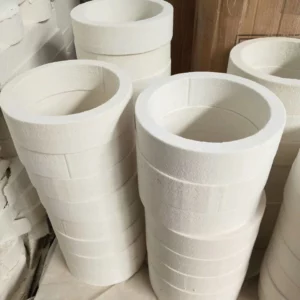Customized ceramic fiber vacuum is a high-temperature insulation material that has several advantages over other insulation materials.
Here are some key differences between customized ceramic fiber vacuum and other insulation materials:
Higher temperature resistance: Customized ceramic fiber vacuum can withstand higher temperatures than most other insulation materials, making it a good choice for high-temperature applications.
Lower thermal conductivity: Customized ceramic fiber vacuum has a lower thermal conductivity than many other insulation materials, which means it can provide better insulation in high-temperature environments.
Vacuum compatibility: Customized ceramic fiber vacuum is designed to be compatible with vacuum environments, which can help prevent outgassing and other issues that can occur with other insulation materials.
Resistant to chemicals: Customized ceramic fiber vacuum is resistant to many chemicals, making it suitable for use in environments with corrosive chemicals or gases.
Customizable shapes and sizes: Customized ceramic fiber vacuum can be custom-designed to fit specific shapes and sizes, allowing for precise insulation in a range of applications.
Easy installation: Customized ceramic fiber vacuum can be easily installed using standard insulation techniques, such as wrapping, molding, or spraying.
Compared to other insulation materials such as fiberglass, mineral wool, or foam insulation, customized ceramic fiber vacuum offers superior high-temperature resistance, lower thermal conductivity, and vacuum compatibility. customized ceramic fiber vacuum However, it may be more expensive than other insulation materials, and its use may require additional safety precautions due to the potential health hazards associated with exposure to ceramic fibers. It’s important to consider the specific requirements of your application when selecting an insulation material and to consult with insulation experts and manufacturers to ensure that you are selecting the right material for your needs.
How does the cost of customized ceramic fiber vacuum compare to other insulation materials?
The cost of customized ceramic fiber vacuum can be higher than many other insulation materials, such as fiberglass, mineral wool, or foam insulation. The higher cost is due in part to the specialized manufacturing process and the high-temperature resistance of ceramic fiber.
However, the cost of customized ceramic fiber vacuum may be justified in applications where high-temperature resistance, vacuum compatibility, and low thermal conductivity are critical requirements. In these cases, the superior performance of ceramic fiber may outweigh the higher cost.
It’s important to consider the total cost of ownership when comparing insulation materials, rather than just the initial purchase cost. Factors such as installation time, maintenance requirements, energy savings, and longevity should be taken into account when evaluating the cost-effectiveness of different insulation materials.
Additionally, the cost of customized ceramic fiber vacuum can vary depending on the specific application and the amount of customization required. Working with an experienced insulation manufacturer or supplier can help ensure that you are getting the right insulation material for your needs at a cost that makes sense for your budget.

